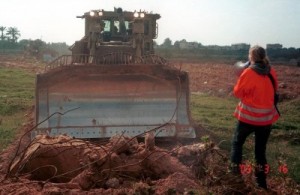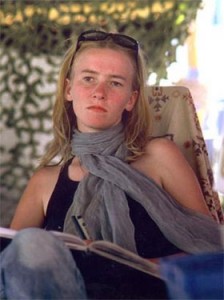Wednesday, March 16, 2016, will mark 13 years since American peace activist Rachel Corrie was killed by the Israeli military in the Palestinian city of Rafah.
 When Corrie stood in front of a Caterpillar bulldozer that was preparing to demolish the home of her host family, she thought her American citizenship could protect her and, by extension, the home, from the Israeli military. She was wrong.
When Corrie stood in front of a Caterpillar bulldozer that was preparing to demolish the home of her host family, she thought her American citizenship could protect her and, by extension, the home, from the Israeli military. She was wrong.
For Rochelle Gause and Serena Becker, the event would change and reshape their lives. I talked to the two women to get their perspectives on the effects of Corrie’s death, the Israel-Palestine conflict from 2003-today, and their reflections on the potential of a life cut short.
Rachel Corrie was born in Olympia, Washington, on April 10, 1979. She grew up in the city’s community, and was an enthusiastic and skilled writer and artist from an early age. Her diaries show a precocious and bright young woman with strong and principled ideas of peace and justice.
 Corrie attended The Evergreen State College in her native Olympia in the early 2000s where she had a political awakening, working with a number of social justice movements and eventually joining the International Solidarity Movement. As an independent study project in her senior year in early 2003, she made the trip to Rafah to establish a sister city project with her native Olympia and work in solidarity with the Palestinian people.
Corrie attended The Evergreen State College in her native Olympia in the early 2000s where she had a political awakening, working with a number of social justice movements and eventually joining the International Solidarity Movement. As an independent study project in her senior year in early 2003, she made the trip to Rafah to establish a sister city project with her native Olympia and work in solidarity with the Palestinian people.
Corrie and her fellow activists from ISM had been using their bodies as protection for homes in the city of Rafah, on the southern tip of the Gaza Strip. The practice had had some previous success for the ISM activists, so Corrie’s action on March 16 was not unique.
It would prove lethal.
The Israeli military bulldozer ran Corrie over, pushing her backwards and under the treads. She died from suffocation less than an hour later.
When the news of Corrie’s death reached Olympia it had a profound effect on Gause and Becker. Both women were already involved in political activism in the city surrounding peace and justice and Corrie’s death would turn that activism into a consuming passion.
“In the immediate aftermath, her death affected me in the sense that I got deeper into the issue of the occupation,” Becker said. “I got more active in the organizing that I did in respect to Palestine.”
Becker traveled to the Occupied Territories in 2002 where she “witnessed the facets of the occupation firsthand” and returned to the US with a more radicalized and critical approach to politics.
The Israel-Palestine conflict provided Becker with her first introduction to radical politics. It prompted her to deconstruct the mainstream media narratives of popular struggles and oppression.
Becker and Corrie both attended Evergreen at the same time in the early 2000s. They would have graduated together in June of 2003. Although the two women “weren’t incredibly close,” their shared politics and concern for the Palestinian people made Corrie’s death especially personal for Becker.
Becker worked to keep Corrie’s legacy alive by helping to form the Olympia-Rafah Sister City Project. The cultural exchange was a dream of Corrie’s, and one of the reasons for her trip to Gaza. Becker also worked for the Rachel Corrie Foundation for Peace and Justice, which was founded by Corrie’s parents after her death.
Becker has returned to Palestine twice since 2002, once in 2005 and once in 2009 when she led a delegation of 15 people to Gaza as a representative of The Rachel Corrie Foundation. The delegation included members of a range of civil society groups, human rights groups, and journalists.
The trip aimed to educate the participants on the complexities of the Palestinian struggle. Becker believes it was successful.
“They brought what they learned into their work here [in the west],” she said. “They’ve taken their newfound knowledge and are applying it to their field.”
Corrie’s death was also a pivotal moment for Rochelle Gause.
“Her death completely rerouted my life,” she said, “I was doing community organizing in Olympia after 9/11 trying to stop the imminent war with Afghanistan. That was how [I met Rachel in the first place]. I knew very little about Palestine.”
That all changed in March of 2003. Philosophically, it was a wake-up call.
“It opened my eyes to a huge reality that I was clueless about. I had no idea how large of a role we as average Americans play in the life of Palestinians,” Gause said. “And I think that’s sad in its own way, because at the time she was killed Palestinians were being killed daily and I paid no attention.”
She’s been paying attention ever since.
Gause has traveled to Palestine repeatedly over the intervening 13 years doing solidarity work across the territories.
“Each time I have gone I have spent most of my time in a new place,” she said.
Most recently, in August of 2015, she worked in Silwan, a neighborhood in East Jerusalem. She helped paint a mural in the neighborhood as part of her work with Art Forces, a solidarity organization that worked with The Rachel Corrie Foundation to erect a mural in downtown Olympia.
Silwan’s community faces “so many forms of dispossession,” Gause said. She described routine harassment and arrest from Israeli security forces and settlers.
“It’s so outrageous and intense,” she said. “And yet the community remains committed to remaining there.”
That bravery is humbling for Gause, and inspires her to continue her work. She has been actively involved in the Boycott, Divestment, and Sanctions movement, which seeks to isolate Israel from the international community until the nation ends certain policies that BDS terms as apartheid.
Despite the increasing success of BDS, the challenges the region faces are daunting. And things have only gotten more difficult over the past 13 years.
“The situation has worsened significantly,” Gause said. She pointed to increased violence, oppression, and dispossession of Palestinians by the occupation as indicators of a more brutal colonization project.
Becker concurs. The continuing lurch by the Israeli government to more and more right wing policies and parties has led to “ramped up political rhetoric” which dehumanizes Palestinians both in Israel and in the Occupied Territories.
“There are deep divisions and fear there,” Becker said. “And as the occupation and its rhetoric become more and more normalized in Israel, and as Israeli violence and oppression impact Palestinians day after day the situation escalates. And political leaders manipulate it with their language.”
Their language has had an effect, especially on younger Israelis. Recent polling shows that young Israelis admit to having ethno-nationalist, racial supremacist views, with almost half endorsing ejecting Arabs from all Israeli controlled territories. An already dire situation promises to only become more polarized and tense as neo-fascist ideas such as these move into the Israeli mainstream and the Palestinian population outstrips the Israeli population in growth.
For the Palestinian youth, radicalization has taken a different form.
“The resistance continues. It shifts forms, but it remains strong,” said Gause. She continues to feel hope for the Palestinian people and their struggle. Her faith in the new generation is clear.
“Some of the local people in Silwan explained to me that this generation is different,” Gause said. “That the grandparents, the first generation living under occupation, were in disbelief. And the next generation was afraid, because they saw such extreme violence and oppression and destruction for their communities.
But this new generation is tough, they don’t have fear, they have known nothing but living under the abuses and injustice. So when the police jeeps drive through Silwan the men used to enter their homes to avoid confrontation. But now the young men today they come out of their homes. What do they have to lose?”
Becker sees a future of shared resistance across the west.
“We’re looking at connections between struggles against oppression now. There are groups like Black Lives Matter making connections, traveling to Palestine. The two movements are becoming linked.”
“Groups across boundaries are coming together.”
“Rachel was an incredible writer, spectacularly creative and saw beauty in the awkward and difficult. I have no doubt she would have made an even larger impact had her life not been stolen.”
Gause was silent for a moment, gathering her thoughts.
“And yet, since right after she died, I have always felt very uncomfortable when people hold her up too high, because it makes the depth of her compassion and commitment to act for others seem unattainable to the majority of us. That is simply not true. Rachel was so very human.”
Corrie’s humanity is what motivated her to stand in front of a massive, military machine. It’s what makes her sacrifice so important, Gause believes. By making a stand for justice, and using her privilege as a revolutionary weapon, she rejected the “individualism of our society and the erasure of our collective histories of standing against injustice.” Corrie’s decision to stand up against the militarized wing of an unjust occupation was a product of her flawed, beautiful, complete humanity.
“If she were alive today, Rachel would be continuing to work for justice in whatever area she would feel was most effective,” Becker opined. “I think she would be very active in working to solve today’s social issues.”
“Rachel was someone who always found hope and inspiration in people’s resistance,” Becker continued, “and I think she would be using her art to find hope in spite of tragedy. She wasn’t someone who would let despair drag her down.”
Gause finds herself holding onto that same hope.
“Having worked on this issue for over a decade and having travelled there several times, I have relationships with many Palestinians. I only wish all Americans could have that same kind of intimate connection and that they could recognize how our realities and our liberations are intertwined and choose to act.”
It’s a sentiment that Corrie shared.
“Maybe if people stopped thinking of themselves, and started thinking of the other sides of things, people wouldn’t hurt each other,” she wrote in 1991. The sentiment is just as true- and hopeful- today.










